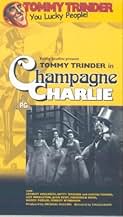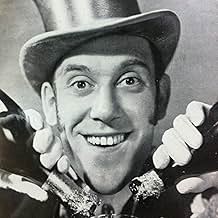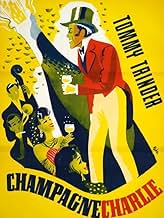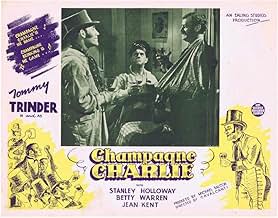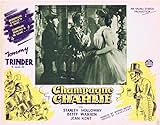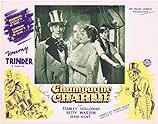The story of a 19th century English music hall performer and life behind the scenes.The story of a 19th century English music hall performer and life behind the scenes.The story of a 19th century English music hall performer and life behind the scenes.
- Director
- Writers
- Stars
Bill Shine
- Mogador Stage Manager
- (as Billy Shine)
Andreas Malandrinos
- Gatti
- (as Andrea Malandrinos)
Peter De Greef
- Lord Petersfield (His Son)
- (as Peter De Greeff)
- Director
- Writers
- All cast & crew
- Production, box office & more at IMDbPro
Featured reviews
The rivalry between George Laybourne and The Great Vance in the music hall era.
I enjoyed this for its affectionate look into a bygone era of British culture, it's amusing characters and impressive set pieces.
The plot is a character-driven and fairly nonintrusive excuse to show a number of musical hall sequences and songs relating to the era. It is very much a film of two halves, with the rivalry between the two great musical hall stars in the first half and the struggle to keep the musical halls open taking focus in the second. A sub-plot involves a fairly uninspired romance.
There are a number of pub and musical hall set-pieces that work very well to capture the tone of the movie and it's subject matter. I found all these scenes highly entertaining. I try to imagine myself watching this in 1944 when the world was in devastation and in need of some positive escapism. It hardly feels authentic Victorian Britain, bit it certainly makes you want to go out, have a few drinks and enjoy yourself in a crowd of friends.
The songs are all good fun but pretty forgettable in the grand scheme of movie music. For me it's all the social settings, high energy, humour and enthusiasm that give it charm.
Performances are mixed, with charismatic stars Tommy Trinder and Stanley Holloway excellent as the above mentioned protagonists, but for me its Betty Warren who holds it altogether with a quite dominant turn as Bessie Bellwood. Most supporting roles are fairly uninspired, however Jean Kent does have a certain presence Dolly.
It's remarkable when you consider that this era depicts entertainment that predates radio broadcasting. Outside of church, this would have been a victorian equivalent of screen time. You look around at the world now and marvel at how much investment and technology has gone into providing people with that continual fix in the palm of their hand.
For me its 6.5/10, but I round upwards.
I enjoyed this for its affectionate look into a bygone era of British culture, it's amusing characters and impressive set pieces.
The plot is a character-driven and fairly nonintrusive excuse to show a number of musical hall sequences and songs relating to the era. It is very much a film of two halves, with the rivalry between the two great musical hall stars in the first half and the struggle to keep the musical halls open taking focus in the second. A sub-plot involves a fairly uninspired romance.
There are a number of pub and musical hall set-pieces that work very well to capture the tone of the movie and it's subject matter. I found all these scenes highly entertaining. I try to imagine myself watching this in 1944 when the world was in devastation and in need of some positive escapism. It hardly feels authentic Victorian Britain, bit it certainly makes you want to go out, have a few drinks and enjoy yourself in a crowd of friends.
The songs are all good fun but pretty forgettable in the grand scheme of movie music. For me it's all the social settings, high energy, humour and enthusiasm that give it charm.
Performances are mixed, with charismatic stars Tommy Trinder and Stanley Holloway excellent as the above mentioned protagonists, but for me its Betty Warren who holds it altogether with a quite dominant turn as Bessie Bellwood. Most supporting roles are fairly uninspired, however Jean Kent does have a certain presence Dolly.
It's remarkable when you consider that this era depicts entertainment that predates radio broadcasting. Outside of church, this would have been a victorian equivalent of screen time. You look around at the world now and marvel at how much investment and technology has gone into providing people with that continual fix in the palm of their hand.
For me its 6.5/10, but I round upwards.
This must be the first time since the nineteenth century that the audience for a show could be heard to leave the building still humming 'Champagne Charlie' :-) (In fact, I did wonder if we were going to get some audience participation at one point -- I was on the verge of it myself -- and am curious as to whether sing-alongs ever happened during the original screenings.) This is a wonderful experience, with Tommy Trinder clearly in his element as music-hall entertainer George Leybourne: his singing voice clearly doesn't equal that of Stanley Holloway, but he can put over the songs so well that you can credit him as a serious competitor... if one can ever describe either of these two as 'serious'! Betty Warren is magnificent in every sense of the word, the very image (and figure) of a Victorian stage star, brimming with coquetry, charisma and sound business sense, and it's a pity that the only number featuring these three together gives her so little to do. A host of minor, unnamed but recurring characters bring the genial, raucous world of the music hall to life, with its flickering stage flares, its haze of smoke and its plentiful supply of drink.
But the true stars of the picture are surely the composers and lyricists who contributed the host of songs that enliven the soundtrack, the new music fitting seamlessly with such genuine period hits as "Champagne Charlie" and "The Daring Young Man on the Flying Trapeze". The plot requires the rival stars to cap one another with song after song on the theme of alcohol, every one of which has to be a credible smash hit: with writers like Billy Mayerl and Noel Gay involved, plus the bravura delivery of the two vocalists, the audience both offscreen and on are completely convinced.
But the true stars of the picture are surely the composers and lyricists who contributed the host of songs that enliven the soundtrack, the new music fitting seamlessly with such genuine period hits as "Champagne Charlie" and "The Daring Young Man on the Flying Trapeze". The plot requires the rival stars to cap one another with song after song on the theme of alcohol, every one of which has to be a credible smash hit: with writers like Billy Mayerl and Noel Gay involved, plus the bravura delivery of the two vocalists, the audience both offscreen and on are completely convinced.
This film is the nearest that Ealing Studios came to making a musical, but the final result is something quite different from that of MGM or Warner Bros. Imagine a full blooded b/w Victorian etching, lit by gas lamps and studded with glittering period detail. The songs are brash, catchy and bright. The direction by Cavancanti brings in his documentary realism with fast cutting, high and low angle shots - breaking with convention at every chance. The result of all this is that the film has hardly dated. It isn't well known, but it ought to be rediscovered. The photography sparkles and shines on carefully recreated 1860 London settings. If the film has a fault, it is that in trying to avoid formula, it often skips over details. For example, we aren't given time to understand how many of the songs are written. The title character was a real life singer - George Leybourne. Wartime comedian Tommy Trinder is obviously enjoying the part and Stanley Holloway provides strong support. In 1944 this film was designed to raise morale and generate goodwill. It still does.
This is based on the life of music hall star George Laybourne, tracking his rise from singing in pubs to becoming one of the top entertainers of his day. Although the competition over who had the better drinking song between Laybourne and rival The Great Vance (Stanley Holloway, obviously thoroughly relishing the role) did supposedly take place, the film isn't overly accurate historically and does skim over detail somewhat. On the positive side, this does make room for more songs and the film packs in plenty with the numbers being infectiously catchy and marvellously well delivered. Sadly, this seems to be a somewhat forgotten Ealing film, which is a shame as it gives excellent insight into a decidedly odd, but enjoyable looking form of particularly British entertainment now consigned to history.
Yes it is perhaps one of Ealing Studios forgotten films, but that really shouldn't surprise too much since it is a very acquired taste, and something of a curio piece to those not familiar with the source of the story. The film is a quaint look at mid Victorian musical halls and the people who frequented such establishments, it shows in earnest just what wonderful places they were for people to escape to. The songs come thick and fast and are all jolly numbers that can't help to lift the spirits, but chiefly central to the films above average rating is the rivalry between the two main players in the piece. Stanley Holloway and Tommy Trinder sing for different musical halls, and it is this story arc that makes for much fun culminating in a quite daft but delightful duel sequence.
The film came in for some criticism due to it not portraying the dank and miserable side of mid Victorian England, but as George Perry says on his introduction to the DVD of the film, "it really is all about escapism", not only for the people back then who sought fun there, but also for us the viewers, 7/10.
The film came in for some criticism due to it not portraying the dank and miserable side of mid Victorian England, but as George Perry says on his introduction to the DVD of the film, "it really is all about escapism", not only for the people back then who sought fun there, but also for us the viewers, 7/10.
Did you know
- TriviaFilm debut of Hazel Court, who had one line of dialogue.
- Crazy creditsOpening credits prologue: In the year of Grace 1860, two brothers set out from the mining village of Leybourne for London Town . . . .
- ConnectionsFeatured in Those British Faces: A Tribute to Stanley Holloway 1890-1982 (1993)
- SoundtracksThe Man on the Flying Trapeze
(uncredited)
Music by Alfred Lee
Lyrics by George Leybourne
Arranged by Ernest Irving
Details
- Runtime1 hour 45 minutes
- Color
- Aspect ratio
- 1.37 : 1
Contribute to this page
Suggest an edit or add missing content


